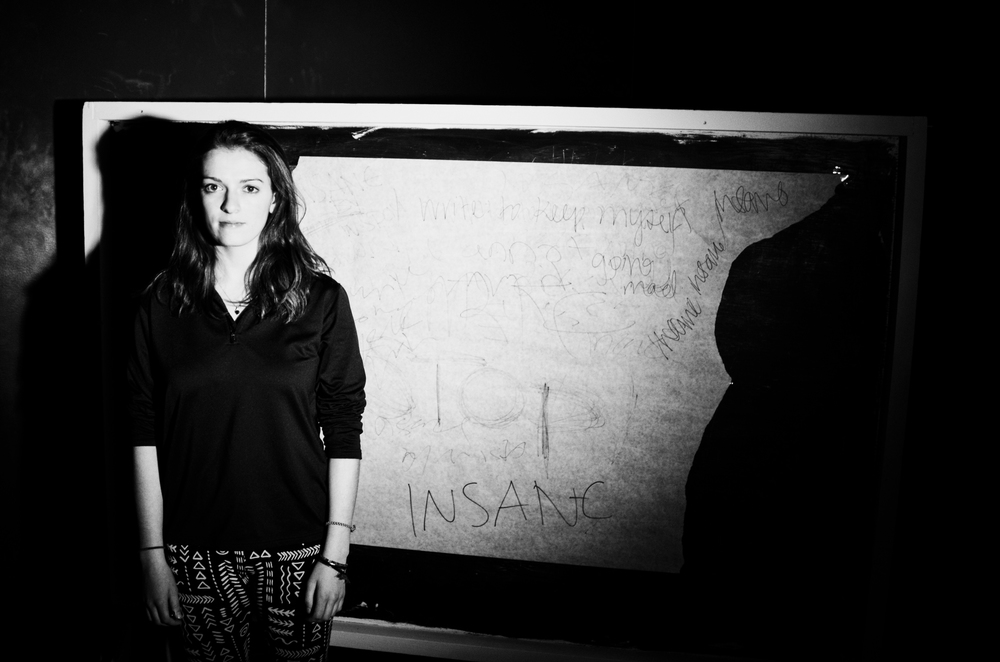
Rachel Karp, JKB Studio A. Photo: Gabe Cohn
Rachel Karp’s new play, “Of White Walls and Words,” which follows the story of a grief-stricken young woman named Charlie and her conversations with the 16th-century essayist Michel de Montaigne, premiers as a workshop production at the JKB on February 21st. She is being interviewed here by Brandon Bogle, a senior theater major and staff writer.
What are the themes of your play and how does the use of montaigne emphasize them?
The central question of the play, and for the main character Charlie, is how to continue living while in the midst of personal crisis and how to move forward. That is a question that Montaigne and I think most people struggle with over the course of their lives, but Montaigne documented that struggle through his personal essays. Everything that Montaigne says or most of what he says in the play—he’s in it as a character—ties back into Charlie’s struggle of how to answer that question, whether it’s her fears or her grief.
What has it been like moving from your initial idea of using montaigne quotes in a play to mounting a full workshop?
On paper it’s fairly easy to figure out which quotes fit in with which themes. But as we started putting it on stage, introducing all these other elements and developing other characters, it became very clear which moments in Montaigne’s text interfered with the conversational quality of the dialogue and which pushed it forward. So that’s been really helpful, and we’ve made changes to the script because of that.
How has the process differed from what you expected?
It has exceeded my expectations in most ways. I knew that having actors to work with for this large chunk of time was going to be huge in helping me develop the play and actually bring it to life. I went in to the process with a pretty clear expectation and structure of how it would go. We spent the first week experimenting, playing and working with the script. That week in particular blew me away with what the cast did with what I’d already written and what they did with some of the source text. They devised new, additional material that ended up in the play.
Has this process changed how you view directing or playwriting?
I think yes and yes. It has changed how I view playwriting in that I love writing but I’m not the type of person who can spend my whole life writing by myself. And this has opened up the door to the possibility of more collaborative forms of playwriting, which I think is really exciting. In terms of directing, personally it has reinforced the fact that I’m really excited about directing and want to direct. But in general it’s the same as with playwriting in that it has introduced me to this more collaborative way of directing. And maybe directing isn’t all that different from writing…it’s just that with directing you’re playing with real people in real space in real time.
In what ways do you think the show would be different if you had someone else directing?
It’s an impossible question. I think any director would probably bring to the table some really amazing ideas that I wouldn’t have thought of on my own. But on the flip side of things I think it would have changed the entire process because there were things I hadn’t quite figured out on the page as the playwright that I was able to work through as the director. That wouldn’t have happened if I had someone else directing.
Where do you see your project headed next?
That’s a big question. I would love more than anything for it to continue to exist, in one form or another. Whether that’s me writing a second act, submitting it to festivals, or setting it aside for now and coming back to it later.
What do you hope people take away from seeing your show?
I don’t know. I don’t want to tell people what to think!
Rachel Karp’s “Of White Walls and Words” performs at the JKB from Feb. 21st to Feb. 23rd, with all performances beginning at 7pm. For reservations, email rmoors@skidmore.edu.
